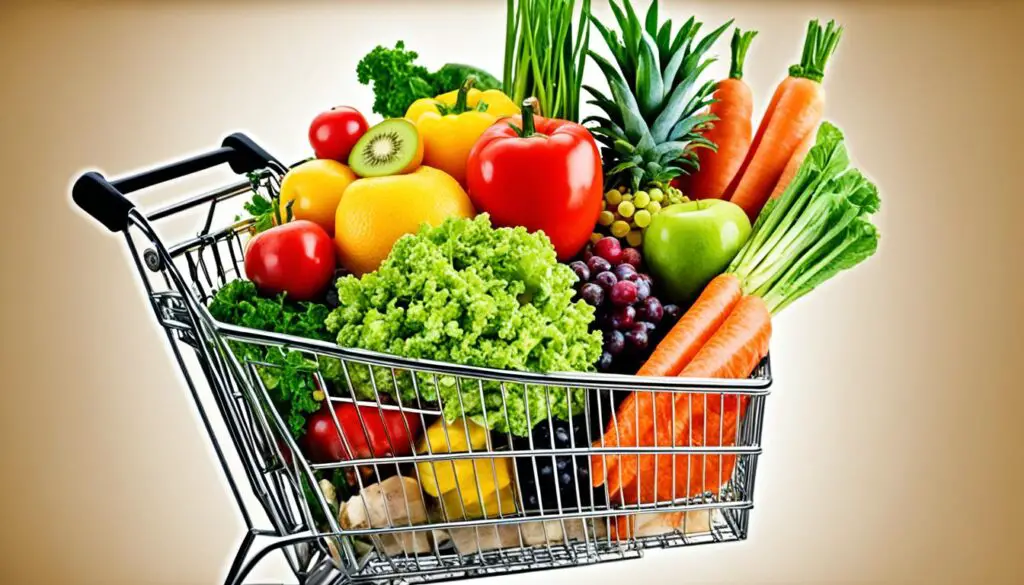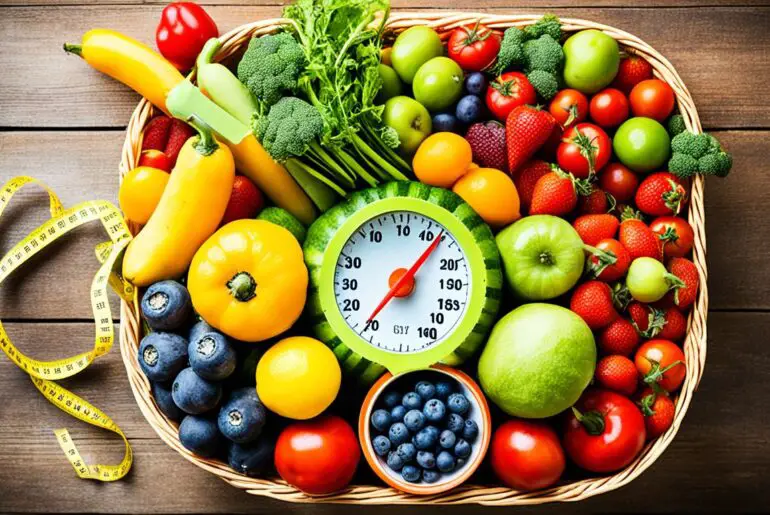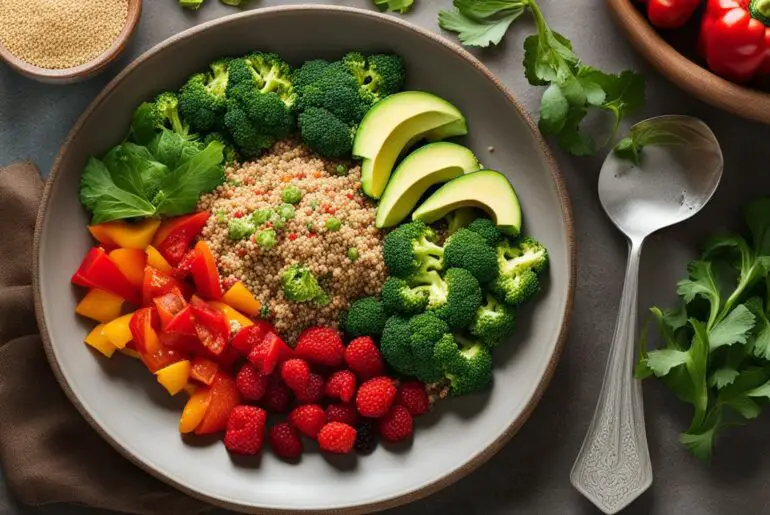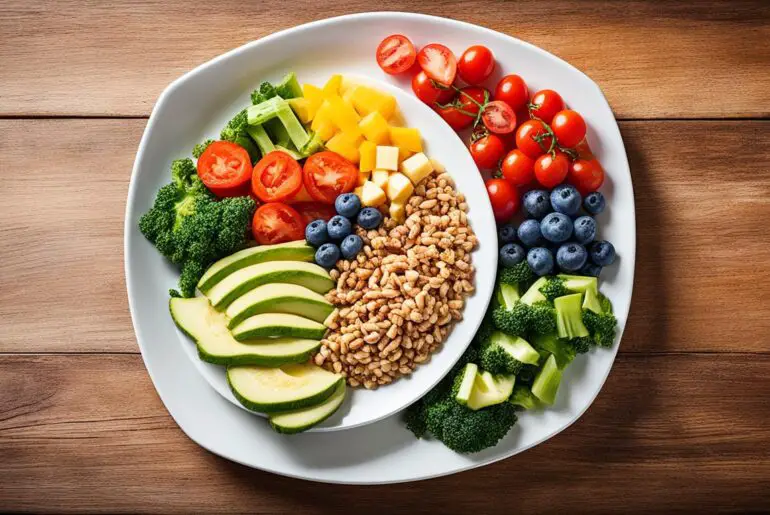Are you struggling to find a healthy meal planner that aligns with the HCG diet? Look no further! In this article, I will provide you with a comprehensive weekly meal planner specifically designed for the HCG diet. Say goodbye to calorie counting and endless recipe searches – I’ve got you covered.
Whether you’re a beginner on the HCG diet or a seasoned pro, following a structured meal plan is crucial for success. With the right meal planner, you can ensure that you’re getting the nutrients you need while staying within the calorie restrictions.
But why is a meal planner so important for the HCG diet? And what are some of the healthy meal ideas that you can incorporate into your weekly plan? Let’s dive in and find out!
The Phases of the HCG Diet
The HCG Diet is divided into three key phases: the loading phase, the weight loss phase, and the maintenance phase. Each phase is crucial for achieving the desired results and ensuring long-term success on the HCG Diet.
The Loading Phase
During the loading phase, you have the opportunity to indulge in high-fat foods to prepare your body for the low-calorie phase. This phase typically lasts for two days and involves consuming ample amounts of healthy fats like avocados, nuts, and olive oil. These foods help kickstart your metabolism and provide your body with the necessary nutrients to sustain the upcoming calorie restriction.
The Weight Loss Phase
The weight loss phase is the heart of the HCG Diet. It involves following a tailored meal plan that limits your calorie intake to 500 calories per day while continuing to take HCG injections or supplements. This phase typically lasts for three to six weeks, depending on your weight loss goals. The HCG hormone helps suppress hunger and promotes fat burning as your body adjusts to the low-calorie intake.
The Maintenance Phase
After completing the weight loss phase, you will enter the maintenance phase, which focuses on stabilizing your weight and establishing healthy habits for the future. During this phase, you gradually increase your calorie intake and transition back to a more balanced diet. It is important to avoid certain foods, such as sugars and starches, to prevent weight regain.
Following these phases in the HCG Diet allows your body to reset its metabolism, burn fat, and effectively achieve sustainable weight loss.
| Phases | Duration | Key Actions |
|---|---|---|
| Loading Phase | 2 days | Indulge in high-fat foods to prepare for calorie restriction |
| Weight Loss Phase | 3-6 weeks | Follow a 500-calorie meal plan and take HCG injections |
| Maintenance Phase | Ongoing | Gradually increase calorie intake and avoid certain foods |
Foods to Include in the HCG Diet Meal Plan
When following the HCG Diet, it is important to include specific foods in your meal plan to ensure you are getting the necessary nutrients while maintaining the required calorie limit. The HCG Diet focuses on lean proteins, non-starchy vegetables, and a small amount of fruits.
Lean Proteins
Lean proteins are a vital component of the HCG Diet as they provide essential amino acids and help maintain muscle mass. Some lean proteins that are allowed on the HCG Diet include:
- Chicken breast
- Shrimp
- Beef
- White fish
Non-Starchy Vegetables
Non-starchy vegetables are low in calories and high in fiber, making them an excellent choice for the HCG Diet. These vegetables help you feel full while providing essential vitamins and minerals. Some non-starchy vegetables that you can include in your HCG Diet meal plan are:
- Asparagus
- Celery
- Spinach
Fruits
While fruits are limited on the HCG Diet due to their natural sugar content, you can still enjoy a small amount of certain fruits. Fruits that are allowed on the HCG Diet include:
- Apples
- Strawberries
- Oranges
It is important to choose fresh, whole foods and avoid added sugars, fats, and oils. By following the approved food list for the HCG Diet, you can maintain the calorie limit and nutrient balance necessary for successful weight loss.
Approved Foods for the HCG Diet
| Food Group | Approved Foods |
|---|---|
| Lean Proteins | Chicken breast, shrimp, beef, white fish |
| Non-Starchy Vegetables | Asparagus, celery, spinach |
| Fruits | Apples, strawberries, oranges |
Creating a Grocery List for the HCG Diet

When shopping for the HCG Diet, it is important to have a well-planned grocery list. By including the right foods, you can stay on track and ensure your meals are HCG-friendly. Here are some key items to add to your hCG diet grocery list:
Lean Proteins:
- Chicken
- Shrimp
- Beef
Non-starchy Vegetables:
- Asparagus
- Spinach
- Cucumbers
Fruits:
- Apples
- Strawberries
- Oranges
When creating your grocery list, it’s important to avoid foods that are high in fats, sugars, and added oils. Stick to fresh, whole foods that align with the HCG Diet guidelines. By having a clear grocery list, you can make shopping for HCG-friendly foods much easier.
Sample Meal Plans for the HCG Diet
Here are some sample meal plans for the HCG Diet:
| Meal Plan Name | Sample Menu |
|---|---|
| ‘Budget’ HCG VLCD Sample Menu |
|
| ‘Spruced Up’ HCG VLCD Sample Menu |
|
These sample meal plans provide guidelines for the types of foods you can eat on the HCG Diet and can help you create your own meal plan based on your preferences and dietary needs.
Tips for Maintaining the HCG Diet

Maintaining the HCG Diet can be challenging, but with a few tips, you can stay on track.
- Plan your meals in advance and have an organized grocery list.
- Cook meals ahead of time and portion them out for the week.
- Keep healthy snacks on hand to avoid temptation.
- Stay hydrated and drink plenty of water throughout the day.
- Find support from others following the HCG Diet and share tips and experiences.
These strategies can help you stay motivated and achieve success on the HCG Diet.
The Benefits of the HCG Diet
The HCG Diet offers several benefits for individuals looking to achieve weight loss success. This unique diet plan utilizes the hormone HCG to stimulate the body’s metabolism and support fat burning. Here are some key benefits of the HCG Diet:
- Rapid Weight Loss: By following the HCG Diet meal plan, individuals can experience significant weight loss in a relatively short period of time. The combination of caloric restriction and HCG hormone injections works together to promote efficient fat burning and accelerate the weight loss process.
- Reduced Appetite: The HCG hormone has the ability to help suppress appetite, making it easier for individuals to adhere to the low-calorie meal plan. This can provide a sense of control and reduce cravings, ultimately contributing to successful weight loss.
- Preservation of Muscle Mass: Unlike many restrictive diets, the HCG Diet focuses on preserving muscle mass while targeting fat stores for energy. This is essential for maintaining overall strength and vitality during weight loss.
It is important to note that individual results may vary, and it is always recommended to consult with a healthcare professional before starting any new diet or weight loss program. The HCG Diet can be an effective tool for those seeking rapid weight loss, but it should be approached with caution and under the guidance of a medical expert.
| Benefits of the HCG Diet | Description |
|---|---|
| Rapid Weight Loss | Promotes significant weight loss in a short period of time |
| Reduced Appetite | Helps suppress hunger and cravings, making it easier to stick to the meal plan |
| Preservation of Muscle Mass | Focuses on fat burning while preserving muscle for overall strength and vitality |
Potential Challenges of the HCG Diet

While the HCG Diet offers a structured approach to weight loss, it does come with its fair share of challenges. It is important to be aware of these potential difficulties and find ways to overcome them in order to successfully navigate the HCG Diet journey.
Strict Caloric Restriction
The most significant challenge of the HCG Diet is the strict caloric restriction, limiting daily calorie intake to just 500 calories. Such a low-calorie diet can lead to various challenges, including:
- Fatigue: With a limited calorie intake, it is common to experience low energy levels and fatigue throughout the day.
- Irritability: The calorie restriction can also contribute to feelings of irritability and mood swings.
- Hunger: It is natural to experience hunger and cravings when consuming such a low number of calories.
Sticking to the Approved Food List
Another challenge of the HCG Diet is adhering to the approved food list. It can be difficult to resist temptations and cravings for foods that are not allowed. Additionally, finding creative ways to prepare meals with the limited ingredients can be a challenge.
Meal Preparation and Planning
Following the HCG Diet requires meticulous meal preparation and planning. Ensuring meals align with the approved food list, portion control, and calorie restrictions can take extra time and effort. This can be challenging for individuals with busy schedules or limited culinary skills.
Motivation and Support
The HCG Diet may be mentally and emotionally challenging, especially when facing cravings or struggling with the strict regimen. Having a strong motivation and support system in place is crucial to overcome these challenges and stay committed to the HCG Diet.
Despite these challenges, with dedication and perseverance, many individuals have successfully achieved their weight loss goals on the HCG Diet. By staying informed, seeking support, and addressing these potential difficulties head-on, you can increase your chances of success and make the most of your HCG Diet journey.
Maintaining Weight Loss After the HCG Diet

After completing the HCG Diet, it is important to maintain your weight loss by adopting a healthy lifestyle. To ensure long-term success, focus on the following key factors:
Regular Exercise
Engaging in regular physical activity is essential for maintaining weight loss. Incorporate a combination of cardiovascular exercises, such as jogging or cycling, and strength training to build lean muscle mass.
Balanced Meals
Continue to prioritize balanced meals that include a mix of macronutrients, including lean proteins, complex carbohydrates, and healthy fats. This will provide your body with the necessary nutrients and promote satiety.
Portion Control
Be mindful of portion sizes to avoid overeating. Use smaller plates and bowls to help control portion sizes visually. Pay attention to your body’s hunger and fullness cues to prevent unnecessary snacking or overindulgence.
Incorporate Whole Foods
Choose whole foods that are minimally processed and rich in nutrients. Incorporate a variety of fruits, vegetables, whole grains, and lean proteins into your meals to provide your body with essential vitamins, minerals, and antioxidants.
Stay Hydrated
Drinking an adequate amount of water is crucial for maintaining weight loss. Aim to consume at least eight glasses of water per day and limit the consumption of sugary drinks and processed beverages that can contribute to weight gain.
Continuous Monitoring
Monitor your weight regularly to stay aware of any fluctuations. If you notice a slight increase, adjust your diet and exercise routine accordingly. Remember, minor fluctuations are normal, but it’s important to address significant changes promptly.
By adopting a healthy lifestyle that includes regular exercise, balanced meals, portion control, and continuous monitoring, you can successfully maintain your weight loss after completing the HCG Diet. Remember that gradual, sustainable changes are key to long-term success.
Conclusion
In conclusion, the HCG Diet offers a structured meal plan and hormone injections to support weight loss. By diligently following the meal plan and adhering to the recommended guidelines, many individuals have achieved significant and successful weight loss results. However, it is crucial to consult with a healthcare professional before embarking on the HCG Diet to ensure it is safe and suitable for your specific needs.
Throughout the HCG Diet journey, it is important to listen to your body, stay committed, and make long-term lifestyle changes in order to sustain your weight loss in the future. Remember that the HCG Diet is not a quick-fix solution, but rather a stepping stone towards adopting healthier habits and practices.
Incorporating regular exercise, balanced meals, and portion control into your daily routine will help you maintain your desired weight even after completing the HCG Diet. Focus on incorporating whole foods, lean proteins, and plenty of fruits and vegetables into your diet, while limiting the consumption of sugary drinks and processed foods. Continuously monitor your weight and make adjustments as needed to ensure long-term success.
FAQ
What is the HCG Diet?
The HCG Diet is a weight loss program that involves caloric restrictions and regular injections of the HCG hormone. It is based on a specific meal plan that includes two meals per day and a limited calorie intake of 500 calories.
What are the phases of the HCG Diet?
The HCG Diet is divided into three phases: loading phase, weight loss phase, and maintenance phase. During the loading phase, you can eat high-fat foods to prepare your body for the low-calorie phase. The weight loss phase is when you follow the 500-calorie meal plan and continue taking HCG injections. The maintenance phase is where you gradually increase your calorie intake and avoid certain foods to maintain your weight loss.
What foods are included in the HCG Diet meal plan?
The HCG Diet meal plan includes lean proteins such as chicken breast, shrimp, beef, and white fish. Non-starchy vegetables like asparagus, celery, and spinach are also allowed. You can have a small amount of fruits like apples, strawberries, and oranges. It is important to choose fresh, whole foods and avoid added sugars, fats, and oils.
How do I create a grocery list for the HCG Diet?
When shopping for the HCG Diet, it is important to have a well-planned grocery list. Make sure to include lean proteins such as chicken, shrimp, and beef. Non-starchy vegetables like asparagus, spinach, and cucumbers should be included as well. Fruits like apples, strawberries, and oranges can be added to the list. Avoid foods high in fats, sugars, and added oils.
Can you provide some sample meal plans for the HCG Diet?
Here are some sample meal plans for the HCG Diet:
– ‘Budget’ HCG VLCD Sample Menu: Includes foods like chicken breast, steak, asparagus, and strawberries.
– ‘Spruced Up’ HCG VLCD Sample Menu: Includes foods like french vanilla cappuccino, grilled chicken, and shrimp.
These sample meal plans provide guidelines for the types of foods you can eat on the HCG Diet and can help you create your own meal plan based on your preferences and dietary needs.
What are some tips for maintaining the HCG Diet?
Maintaining the HCG Diet can be challenging, but with a few tips, you can stay on track. Plan your meals in advance and have an organized grocery list. Cook meals ahead of time and portion them out for the week. Keep healthy snacks on hand to avoid temptation. Stay hydrated and drink plenty of water throughout the day. Find support from others following the HCG Diet and share tips and experiences.
What are the benefits of the HCG Diet?
The HCG Diet offers several benefits, including rapid weight loss, reduced appetite, and preservation of muscle mass. The hormone HCG can help suppress hunger and increase metabolism, leading to efficient fat burning. Following the HCG Diet meal plan can result in significant weight loss in a short period of time.
What are the potential challenges of the HCG Diet?
The HCG Diet can have some challenges, such as the strict caloric restriction of 500 calories per day, which may cause fatigue, irritability, and hunger. It can also be difficult to stick to the approved food list and avoid temptations. Meal preparation and planning may require extra time and effort. It is important to have a strong motivation and support system to overcome these challenges and stay committed to the HCG Diet.
How can I maintain my weight loss after completing the HCG Diet?
After completing the HCG Diet, it is important to maintain your weight loss by adopting a healthy lifestyle. This includes regular exercise, balanced meals, and portion control. Focus on incorporating whole foods, lean proteins, and plenty of fruits and vegetables into your diet. Stay hydrated and limit consumption of sugary drinks and processed foods.
Is the HCG Diet effective for weight loss?
The HCG Diet offers a structured meal plan and hormone injections to support weight loss. By following the meal plan and sticking to the recommended guidelines, many individuals have experienced successful weight loss. It is important to consult with a healthcare professional before starting the HCG Diet to ensure it is safe and suitable for your specific needs.




